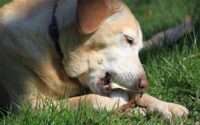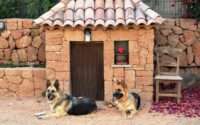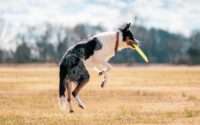10 Reasons Why Do Dogs Sneeze When Playing
If you’re a devoted pet parent, you’ve probably witnessed your canine companion sneezing during playtime. It’s one of those quirky behaviors that can leave us wondering, “Why do dogs do that?” Well, get ready to unravel the mystery behind those adorable sneezes and dive into the fascinating world of our playful pups.
Whether it’s a sign of pure excitement, a form of communication, or even a defense mechanism, understanding the reasons behind why do dogs sneeze when playing will deepen your bond with your furry friend and leave you amazed by their unique ways of expressing themselves. So, let’s embark on a journey of discovery and explore the intriguing world of canine sneezes during play!
The Science Behind Dog Sneezing
Dogs possess a highly developed olfactory system, which means their noses are far more sensitive than ours. In fact, dogs have up to 300 million scent receptors in their noses, compared to our mere 6 million. This heightened sense of smell allows them to detect and distinguish an astounding variety of scents, making their world a symphony of smells that we can only imagine.
When dogs breathe in, the air travels through their nasal passages, which are lined with cilia. These tiny, hair-like structures serve a crucial purpose. They act as a filtration system, helping to trap dust, dirt, allergens, and other particles present in the air. The cilia work together to prevent these irritants from reaching the delicate tissues of the lungs, protecting the respiratory system from potential harm.
However, despite the efficient filtration system in their nasal passages, some particles may occasionally slip through. This is where sneezing comes into play. Sneezing is a natural reflex for dogs, just as it is for humans. It serves as a defense mechanism to expel foreign substances that may have made their way past the cilia and settled in the nasal passages.
During playtime, dogs are often full of energy and enthusiasm, romping around and exploring their surroundings with great gusto. In the midst of all this excitement, it’s not uncommon for them to inhale airborne particles like dust, pollen, or even small bits of grass. These particles can trigger the sneeze reflex, prompting dogs to forcefully exhale air from their noses and mouths, effectively dislodging and expelling any irritants that may be causing discomfort.
Why Do Dogs Sneeze When Playing?
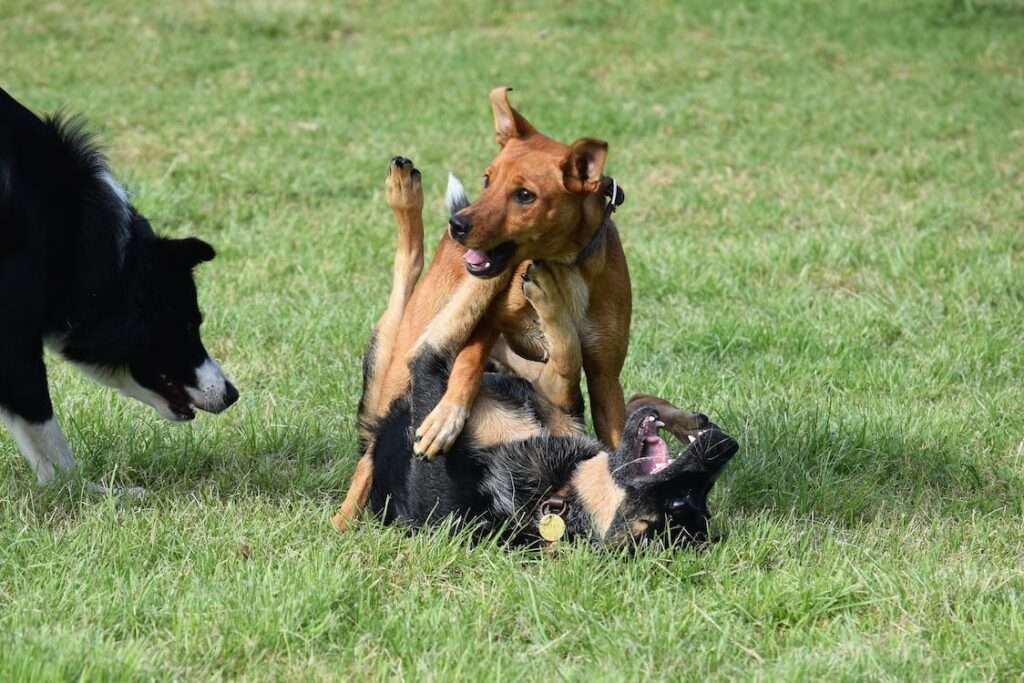
Playing is an integral part of a dog’s life—it’s a time for them to let loose, have fun, and engage with their furry friends and human companions. If you’ve ever noticed your dog sneezing during playtime, you’re not alone. This behavior is quite common among our canine pals, and there are a few reasons why dogs sneeze when they’re caught up in the excitement of play.
One of the primary reasons behind dog sneezing during play is sheer enthusiasm. When dogs get amped up, their energy levels skyrocket, and their bodies are primed for action. This surge of energy can sometimes lead to sneezing as a way for them to release some of that pent-up excitement. It’s almost as if the thrill of play becomes so overwhelming that it needs an outlet, and a sneeze can serve as that little burst of exuberance.
Beyond their own personal enjoyment, dogs also use sneezing as a form of communication during playtime. Dogs are social animals, and they have their own unique ways of interacting with each other and with humans. Sneezing can be one of those ways to convey their intentions and emotions to their playmates.
For instance, a dog may sneeze to signal their desire to continue the playful antics or to invite others to join in the fun. It can be a way for them to say, “Hey, I’m having a blast, let’s keep this party going!” On the other hand, sneezing can also indicate submission or deference to a more dominant dog. It’s their way of showing respect and acknowledging the other dog’s higher status in the play hierarchy.
Sneezing during play is generally harmless and normal, but it’s important to pay attention to your dog’s overall behavior. If sneezing is accompanied by other concerning symptoms like coughing, nasal discharge, or signs of distress, it’s advisable to consult with a veterinarian. Excessive sneezing or persistent discomfort could be a sign of an underlying health issue that requires attention.
10 Reasons Behind Dogs Sneezing When Playing
We all love seeing our furry friends in their element during playtime, and it’s fascinating to observe the various ways dogs express themselves. Sneezing, an action we typically associate with humans, can also be a part of a dog’s play repertoire. Here are ten common reasons why dogs may sneeze during play:
- Sign of excitement and happiness: Dogs experience joy and excitement during play, and sneezing can be their way of releasing that burst of energy. It’s like a little exclamation point of happiness!
- Communication with other dogs: Dogs are social creatures and communicate with each other through body language. Sneezing can be one way for them to signal their intentions, such as inviting other dogs to play or expressing their enthusiasm.
- Attempt to assert dominance: Dogs have their own social hierarchies, and during play, they may sneeze to assert their dominance over another dog. It’s their way of saying, “I’m in charge here!”
- Defense mechanism: When dogs feel threatened or uncomfortable during play, sneezing can serve as a defense mechanism. It’s a way for them to ward off potential threats and establish boundaries.
- Reaction to play bites: Sometimes, dogs may sneeze in response to playful nips or bites from their playmates. It could be a reflexive response to the physical contact.
- Physical exertion during playtime: Playing is a physical activity for dogs, and just like humans, they may sneeze as a natural response to the exertion. It’s similar to how we may breathe heavily or pant after a workout.
- Sensory overload from new stimuli: Dogs are highly sensitive to their environment. If they encounter new scents or stimuli during play, it can overwhelm their senses. Sneezing can be a way to cope with the sensory overload.
- Breathing in dust and dirt particles: Playtime often takes dogs outdoors, where they may come into contact with dust, dirt, or other particles. Inhaling these particles can trigger sneezing as the body attempts to clear the nasal passages.
- Allergic reaction to certain triggers: Dogs, like humans, can have allergies. Sneezing during play may be a response to allergens such as pollen, mold, or certain foods. Identifying and managing these triggers can help alleviate their symptoms.
- Underlying medical conditions: While sneezing during play is usually harmless, it’s important to be aware that certain medical conditions can cause sneezing. Respiratory infections, allergies, or nasal irritations can all lead to sneezing. If you have concerns about your dog’s health, consulting with a veterinarian is advisable.
Understanding the reasons behind dogs’ sneezing during play can enhance our bond with them. It allows us to appreciate their unique communication styles and respond appropriately to their needs. So, the next time your furry friend sneezes during play, cherish the moment and enjoy the shared joy that play brings to both of you!
When to be Concerned
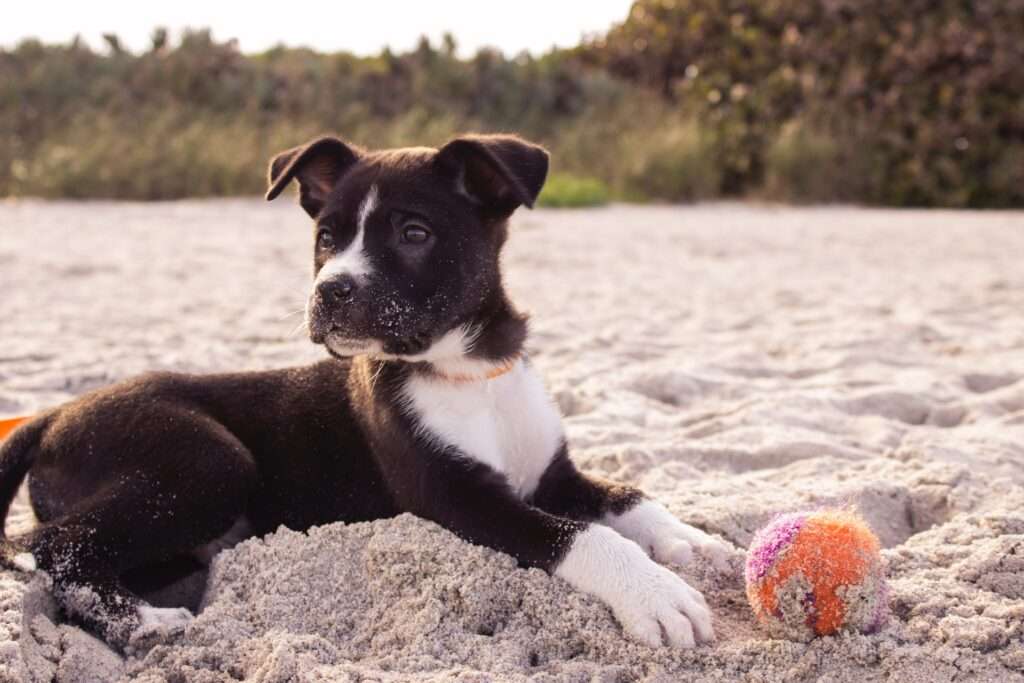
One of the first signs that your dog’s sneezing may warrant attention is if it becomes excessive or persistent. Occasional sneezing during play is usually nothing to worry about, but if it becomes frequent or prolonged, it could indicate an underlying issue. Excessive sneezing might be accompanied by other symptoms, such as coughing, nasal discharge, or labored breathing. These signs should prompt you to seek veterinary care to determine the cause and ensure proper treatment.
The presence of abnormal discharge from your dog’s nose or eyes is another red flag. If you notice mucus, blood, or pus-like discharge accompanying the sneezing, it’s essential to consult with a veterinarian promptly. Such discharge can indicate an infection, allergies, or other respiratory conditions that require medical attention.
Additionally, if your dog has been in contact with other dogs recently and is displaying sneezing behavior, it may be a cause for concern. Sneezing, especially when combined with coughing, could be a sign of a contagious illness like kennel cough. These respiratory infections can spread quickly in social environments or during interactions with other dogs. It’s crucial to isolate your dog from other canines and seek veterinary care to prevent the illness from worsening or spreading further.
It’s important to note that certain breeds, particularly brachycephalic breeds like Bulldogs or Pugs, may be more prone to respiratory issues and sneezing. Their unique anatomy, characterized by shorter airways and compressed nostrils, can make them more susceptible to respiratory difficulties. If you have a brachycephalic breed and notice excessive sneezing or respiratory distress during play, it’s crucial to consult with your veterinarian to ensure your dog’s health and comfort.
How to Help Your Dog
When your dog sneezes during playtime, it’s natural to want to assist them and ensure their comfort. Here are some steps you can take to help your furry friend when they start sneezing during play:
- Provide a safe environment: Make sure your dog’s play area is free from potential hazards that could trigger excessive sneezing. Remove any irritants or allergens, such as dust, strong fragrances, or chemical cleaners that could be present in their surroundings.
- Monitor playmates: Keep an eye on your dog’s playmates to ensure they are not being too rough or aggressive. Excessive play wrestling or tussling may lead to sneezing if your dog gets bumped or their nasal passages are irritated during play. Encourage gentle play and intervene if the roughness becomes excessive.
- Identify and address allergies: If your dog’s sneezing is triggered by allergies, try to identify the specific allergen causing the reaction. It could be pollen, certain plants, dust mites, or even certain foods. Consult with your veterinarian to determine the best course of action. They may recommend allergy testing or prescribe medications to alleviate your dog’s allergy symptoms. Minimizing exposure to allergens can help reduce sneezing episodes.
- Keep playtime moderate: While play is important for dogs, excessive or strenuous play sessions can lead to increased sneezing. Monitor your dog’s activity levels during play and ensure they have appropriate rest breaks. Overexertion can strain their respiratory system and potentially worsen sneezing. Balance high-energy play with calming activities to maintain a healthy and enjoyable playtime experience.
- Consult with a veterinarian: If your dog’s sneezing is persistent, accompanied by other symptoms like nasal discharge, coughing, or if you have any concerns about their health, it’s crucial to consult with a veterinarian. They can perform a thorough examination, assess your dog’s overall health, and provide guidance tailored to your dog’s specific needs.
Remember, every dog is unique, and the underlying reasons for sneezing during play may vary. By paying attention to your dog’s behavior, providing a safe environment, and seeking professional advice when needed, you can help ensure their well-being and make playtime a joyful experience for both of you.
Conclusion
In conclusion, sneezing during playtime is a common behavior for dogs and can be caused by a variety of factors such as excitement, communication, and physical exertion.
While sneezing during playtime is generally harmless, excessive sneezing or other signs of illness may require veterinary care. By understanding the reasons behind your dog’s sneezing behavior, you can better connect with your furry friend and respond appropriately.
Playtime is an important part of your dog’s life as it provides them with mental and physical stimulation. By ensuring a safe and healthy play environment and responding to your dog’s needs, you can help them enjoy their playtime to the fullest.
Thank you for taking the time to read this article on why dogs sneeze when playing. We hope you found it informative and helpful!
Frequently Asked Questions
Q: Why do dogs sneeze when they’re playing?
A: Dogs may sneeze during playtime due to a phenomenon known as “play sneezing.” It’s a common behavior that is believed to be a way for dogs to communicate their playfulness and intentions to their playmates. It’s usually not a cause for concern unless accompanied by other symptoms.
Q: Are there any other reasons why dogs sneeze while playing?
A: Yes, there are a few other possible reasons. Dogs may sneeze when playing to clear their nasal passages, remove foreign objects or irritants, or to show submission or deference to their playmates. If the sneezing is excessive or accompanied by other signs of illness, it’s advisable to consult a veterinarian.
Q: Should I be worried if my dog sneezes a lot during play?
A: Occasional sneezing during play is generally normal and not a cause for concern. However, if your dog sneezes excessively, exhibits other symptoms like coughing, nasal discharge, or seems unwell, it’s best to consult with a veterinarian to rule out any underlying health issues.
Q: Can allergies cause dogs to sneeze while playing?
A: Yes, just like humans, dogs can be allergic to certain substances like pollen, dust mites, or certain foods. If your dog sneezes frequently during playtime but is otherwise healthy, allergies might be the cause. Consulting with a veterinarian can help identify potential allergens and provide appropriate treatment.
Q: Is there anything I can do to minimize my dog’s sneezing while playing?
A: If your dog’s sneezing is excessive or causing discomfort, you can try to minimize potential irritants in the environment, such as dust, strong fragrances, or chemical cleaners. Regularly cleaning your dog’s toys, bedding, and living areas can also help reduce allergens.
Q: Can sneezing during play be a sign of a more serious health issue?
A: While occasional sneezing during play is usually harmless, persistent or severe sneezing accompanied by other symptoms like nasal discharge, coughing, or difficulty breathing may indicate an underlying health issue such as an infection, nasal polyps, or dental problems. Seeking veterinary attention is advisable in such cases.
Remember to consult a veterinarian if you have any concerns or if your dog’s sneezing is excessive, persistent, or accompanied by other abnormal symptoms.


